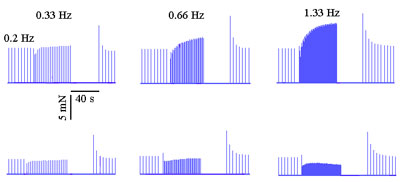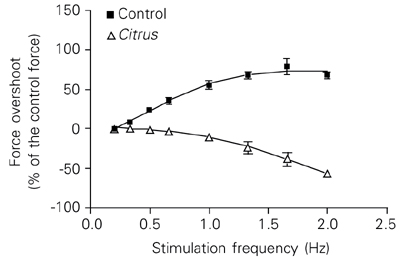The objective of the present investigation was to determine the contractile effect of crude and acetone leaf extracts of Citrus sinensis (L.) Osb. on mammalian myocardium. Crude leaf extracts have been used in folk medicine to treat neurological disorders. Some flavonoids isolated from this plant presented a positive inotropic effect on myocardium. This motivated us to test the extracts on the atria of guinea pigs of both sexes (300-500 g) and surprisingly we observed inotropic depression instead of an increase in force. The maximum effect of the crude extract was 79.4 ± 8.1% of the control force amplitude (N = 5 hearts, 10 trials, 27 ± 0.1ºC, stimulus: 2 Hz, 400 V, 0.5 ms). The EC50 for crude, ethanol, acetic, aqueous, and acetone extracts was 300, 300, 600, 1000, and 140 µg/ml, respectively, with a Hill constant of 1.8, 2.0, 2.5, 2.0, and 1.4, respectively. Blockade of cholinergic, beta-adrenergic, or opioid membrane receptors with 1.5 µM atropine sulfate, 1 µM propranolol, and 10 µM naloxone, respectively, did not change the effect of the crude extract. The acetone extract abolished the Bowditch positive staircase phenomenon (N = 5 hearts, 10 trials, 27 ± 0.1ºC), suggesting a possible reduction of the calcium inward current, and also promoted the so-called Woodworth phenomenon. The effect was concentration-dependent and indicated the existence of another inhibitory contractile mechanism such as the simultaneous activation of some of the membrane potassium channels reducing the myocardial action potential duration and further decreasing the cellular calcium entry.
Citrus sinensis; Contractility; Heart; Myocardium; Woodworth phenomenon





